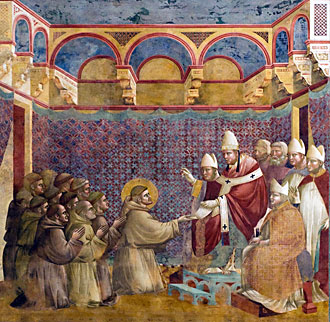Saint Francis of Assisi
One of the most remarkable saints of any period of Christian history was born Giovanni di Pietro di Bernardone in 1181 but was nicknamed Francesco (“Frenchy”) by his Francophile father, a prosperous merchant of Assisi. Francis was a popular young man of no particular distinction until a sudden religious experience in his teens convinced him to live a life of poverty. He consorted with lepers, dressed as a beggar, giving away his own clothes, and donating so much of his father’s wealth to the poor that the older man objected. In a spectacular act of renunciation, Francis stripped himself naked in the public square and gave back everything he possessed to his father. For a time he lived as a hermit, but in 1209 he began to preach and began a mission that soon attracted followers eager to imitate his example. Francis sought permission of Pope Innocent III (see above) to begin a new religious order dedicated to poverty and contact with the poor. He and his followers became the Order of Friars Minor, soon to be known as the Franciscans.
In the early thirteenth century the Church was at its highest point in terms of political power and wealth; Innocent III was the dominant figure in Europe, deposing kings and emperors at his pleasure. The Church hierarchy, however, had lost touch with the spiritual needs of the faithful, many of whom were defecting to heretical groups such as the Waldensians or Cathars. Priests were poor expositors of the religion, serving primarily as dispensers of the sacrament and ignorant of doctrine and preaching. In the Franciscans, and their fellow mendicants the Dominicans, the Church hoped to find a way to reach the poor again.
Francis preached not only in Italy but also in North Africa where he accompanied the Fifth Crusade in 1219 to Egypt. He marched into the Islamic camp and apparently met the Sultan who entertained him for a few days before returning him to the invading army.
Back in Italy the Franciscan Order was becoming rapidly larger and a new more sophisticated Rule had to be imposed to better organize the friars, all of whom were meant to live by begging. By 1220 Francis turned over control of the Order to others and lived only for preaching and praying. In 1224 Francis received the stigmata, the marks of five bleeding wounds suffered on the cross by Christ and in 1226 he died. Almost immediately he was proclaimed a saint and is considered the patron of Italy.
The contributions of Francis and his Order are incalculable. They were able wandering preachers, opponents of heresy; they staffed the faculties of the new universities; they helped to run the Inquisition. Their example of poverty helped to deepen the devotion of medieval Europeans to Christianity. Francis staged the first live Christmas creche and Franciscans wrote the first Christmas carols. The love of St Francis for nature that lead him to preach to fish and animals has made him the patron saint of the ecological movement.
